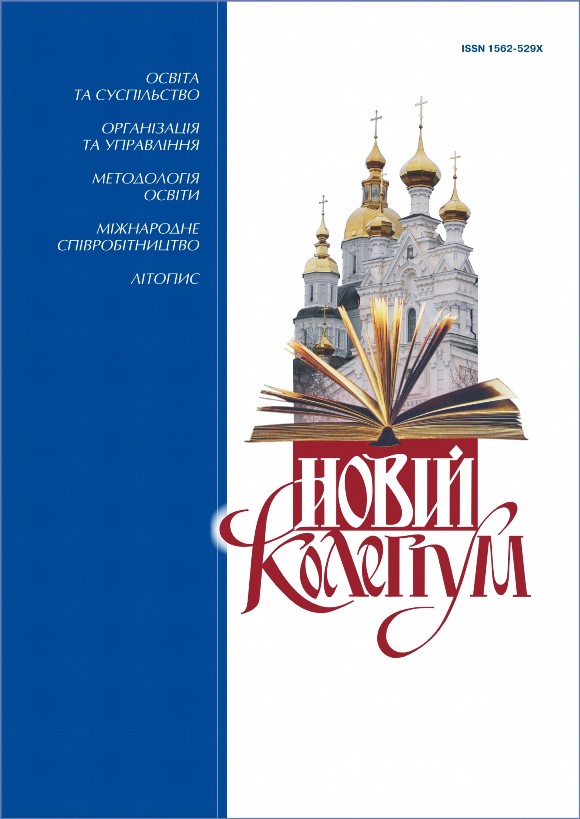Prosptcts for the development of distance and online education in modern conditions
DOI:
https://doi.org/10.30837/nc.2020.4.98Keywords:
distance education, online education, online communications, web-resourcesAbstract
It is noted that in modern conditions the issue of online education development in Ukraine has become especially acute, in particular, in the development of a long-term program to improve secondary and higher online education and ensure its new level of quality. The article is devoted to determining the need for distance and online education, the differences between them, the necessary forms of communication, the advantages and disadvantages of these forms of education, as well as prospects for distance and online education in Ukraine. It has been identified that online and distance education is viable and effective teaching strategies, but each has its own clear advantages and disadvantages for both teachers and students. The article proves that there are the following differences between these types of education: the location of the teacher and students; interaction between teacher and students; intention of teaching strategy. The authors list the advantages of distance education: distance education can continue without interruption, even in cases such as emergencies or the COVID-19 pandemic; distance education provides more flexibility for students to work at their own pace and review assignments as needed. The article summarizes the main forms of online communication between students and teachers - video conferencing, forum, chat, blog, etc. In addition, the most common web resources for distance education: Moodle, Google Classroom, Zoom and others. The problems that arise in the implementation of distance education have been identified: it is impossible to use distance education if students do not have access to devices or the Internet at home; it is difficult to keep a real contribution of the student to the work; distance education can make falsification even easier than online education; distance education can lead to even more screen time for students. It was concluded that the use of the Internet in teaching is necessary both for teachers who seek to offer their students different ways of learning, and for the students themselves. It has been proven that distance education is most useful for those students who have constant access to technology at home and work responsibly and independently, and it has a clear advantage in the event of an unexpected restriction of classes in the free economic zone.
References
Національна доктрина розвитку освіти : Указ Президента України від 17.04.2002р. №347/2002. [Електронний ресурс]. Режим доступу: https://zakon4.rada.gov.ua/laws/show/347/2002
Попова Л.М. Перспективи та напрями розвитку системи вищої освіти в Україні // Матеріали Всеукр. наук.-метод. інтернет-конф. «Проблеми та перспективи розвитку системи вищої освіти в Україні», ХНУБА, 17 жовтня 2019 р. С.31-33.
Гаращук О., Куценко В. Інноваційний шлях розвитку вищої освіти – передумова підвищення її якості // Вісник Київ. нац. ун-ту ім. Тараса Шевченка. 2014. №10 (162). С. 18-24.
Попова Л.М., Кірєєва В.О. Перспективи інноваційного розвитку науки і вищої економічної освіти // Матеріали Всеукр. наук.-практ. інтернет-конф. «Вдосконалення фінансово-кредитного механізму забезпечення інноваційного розвитку економіки» : зб. тез. Ч. 2, Дубляни, 20 травня 2020. С.74-76.
Попова Л.М. Особливості адміністративно-правового регулювання діяльності суб’єктів підприємництва в умовах пандемії коронавірусу COVID-19 // Вісник Луганськ. держ. ун-ту внутрішніх справ ім. Е.О.Дідоренка. Вип. 1(89). Сєвєродонецьк : ЛДУВС імені Е. О. Дідоренка, 2020. С.172-186.
Освіта та батьківство. Кабінет Міністрів України. [Електронний ресурс]. Режим доступу: https://covid19.gov.ua/osvita-ta-batkivstvo
Попова Л.М. Перспективи розвитку науково-технічного та інноваційного потенціалу Харківського регіону // Проблеми та перспективи розвитку сучасної науки : зб. тез доповідей Міжнар. наук.-практ. конф. молодих науковців, аспірантів і здобувачів вищої освіти, м. Рівне, 21-22 травня 2020 р. : у 2 ч. Ч. 2. Рівне : НУВГП, 2020. С.264-267.
Про стан онлайн-освіти в Україні. Блог Д. Лозовицького. [Електронний ресурс]. Режим доступу: http://aphd.ua/pro-stan-onlain-osvity-v-ukrani/
Биков В.Я. Моделі організації систем відкритої освіти. Київ : Атіка, 2009. 684 с.
Огієнко О.І. Дистанційна педагогічна освіта: зарубіжний та вітчизняний досвід : метод. рекомендації. Київ : Нац. академія пед. наук України, 2012. 75 с.
Смульсон М.Л. та ін. Дистанційне навчання: психологічні засади : монографія. Кіровоград : Імекс-ЛТД, 2012. 240 с.
Практики та підходи до дистанційного навчання – рекомендації для вчителів. [Електронний ресурс]. Режим доступу: https://nus.org.ua/articles/praktyky-ta-pidhody-do-dystantsijnogo-navchannya-rekomendatsiyi-dlya-vchyteliv/
Про затвердження Положення про дистанційне навчання : Наказ Міністерства освіти і науки України від 25.04.2013 № 466[Електронний ресурс]. Режим доступу: https://zakon.rada.gov.ua/laws/show/z0703-13#Text
Організація дистанційного навчання в школі : методичні рекомендації / І. Коберник, З. Звиняцьківська [Електронний ресурс]. Режим доступу: https://mon.gov.ua/storage/app/media/zagalna%20serednya/metodichni%20recomendazii/2020/metodichni%20recomendazii-dustanciyna%20osvita-2020.pdf
Топол В. Як працювати в Google-клас: покрокова інструкція. [Електронний ресурс]. Режим доступу: https://nus.org.ua/articles/yak-pratsyuvaty-v-google-klas-pokrokova-instruktsiya/
Stauffer Bri What’s the Difference Between Online Learning and Distance Learning? [Електронний ресурс]. Режим доступу: https://www.aeseducation.com/blog/online-learning-vs-distance-learning.

